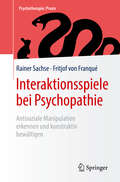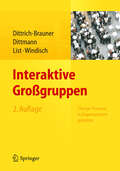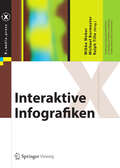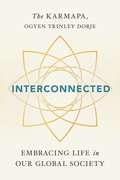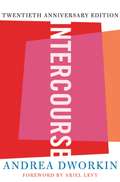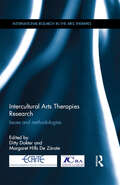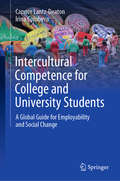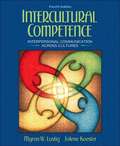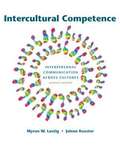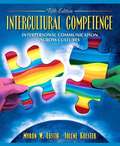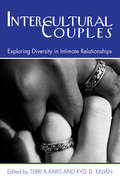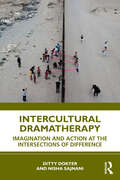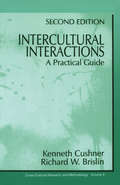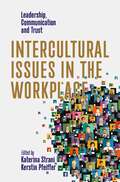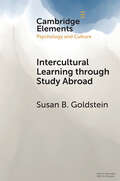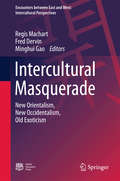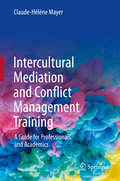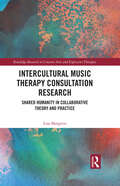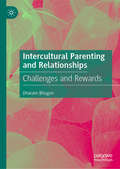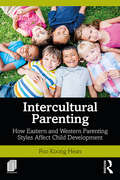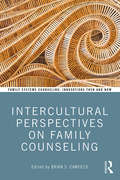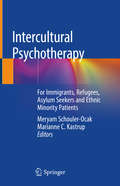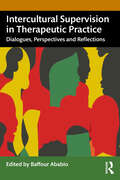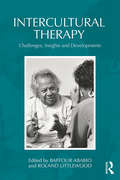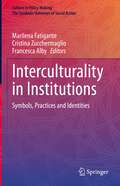- Table View
- List View
Interaktionsspiele bei Psychopathie: Antisoziale Manipulation erkennen und konstruktiv bewältigen (Psychotherapie: Praxis)
by Rainer Sachse Fritjof von FranquéIm vorliegenden Buch wird beschrieben, wie manipulatives Handeln von Personen mit Psychopathie erkannt und bewältigt werden kann. Die psychopathische Persönlichkeitsstörung (engl.: Psychopathy) ist definiert durch eine Kombination aus interaktionellen, affektiven, antisozialen und sich im Lebensstil ausdrückenden Besonderheiten, zu denen Egozentrizität, manipulierendes Verhalten, ein Mangel an Mitgefühl, Schuld und Reue, pathologisches Lügen, Verantwortungslosigkeit sowie die kontinuierliche Verletzung sozialer Normen und Erwartungen zählen. Fachleute haben vor allem Schwierigkeiten, mit den interpersonellen Merkmalen dieser Störung umzugehen. Dieses Buch bietet hierfür konkrete Unterstützung. Geschrieben für … Psychotherapeuten, Coaches, Diagnostiker, Psychiater, forensische Psychologen und alle, die beruflich mit Psychopathen zu tun haben. Die Autoren: Prof. Dr. Rainer Sachse ist Psychologischer Psychotherapeut, Begründer der „Klärungsorientierten Psychotherapie“ und Leiter des Instituts für Psychologische Psychotherapie (IPP) in Bochum. Fritjof von Franqué ist sexualforensischer Psychotherapeut und leitender Psychologe am Institut für Sexualforschung und Forensische Psychiatrie des Universitätsklinikums Hamburg-Eppendorf (UKE).
Interaktive Großgruppen: Change-Prozesse in Organisationen gestalten
by Carmen Windisch Volker List Karin Dittrich-Brauner Eberhard DittmannOrganisationen und ihre Mitarbeiter verändern sich fortlaufend und lernen dazu, um konkurrenzfähig zu bleiben. Zu diesem Zweck setzen Unternehmen immer häufiger Großgruppenverfahren ein, denn diese haben klassischen Workshopmethoden einiges voraus: Sie erzeugen Bewegung, initiieren Kontakte und Diskussionen, fördern die Identifikation und garantieren die Nachhaltigkeit von Veränderungen in Organisationen - kurz: sie binden auf aktive und effektive Weise viele Menschen in einen gemeinsamen Entwicklungsprozess ein. Die Arbeit mit großen Gruppen ist gleichzeitig zielführend und unterhaltsam. Alles drin: Zum einen "klassische Verfahren" wie Zukunftskonferenz, Open Space, Appreciative Inquiry, RTSC, World Café, sowie deren Entwicklung, Einsatzgebiete, Ablauf und Nutzen. Zum anderen Weiterentwicklungen und Trends, neue Anforderungen, integrative Ansätze, Einbindung neuer Technologien u.v.m., sowie Tipps zur Dramaturgie in Großgruppen. Direkt loslegen: Mit konkreten Tipps, Checklisten, Experteninterviews, Fallbeispielen und Erfahrungsberichten aus bekannten Unternehmen, Hinweisen zu speziellen Einsatzmöglichkeiten von Großgruppenverfahren und, damit nichts schiefgeht, Vorbereitungs-Tipps zu Räumlichkeiten, Ton, Visualisierung, Dokumentation und Zeitplanung. Die zweite Auflage wurde aktualisiert und um aktuelle Themen (u.a. Social Media, Großgruppen in Veränderungsprojekten) ergänzt.
Interaktive Infografiken
by Michael Burmester Ralph Tille Wibke WeberIn einer Welt der Multimedialität gewinnt ein Visualisierungstyp zunehmend an Bedeutung: die interaktive Infografik. Sie wird im Journalismus ebenso eingesetzt wie in der Unternehmenskommunikation. Dieses Buch führt auf Grundlage aktueller Forschungserkenntnisse in Theorie, Design und Rezeption von interaktiven Infografiken ein: Wie werden sie wahrgenommen? Welche Vorteile bieten sie für das Verstehen und Behalten von Inhalten? Gibt es Gestaltungs- und Erzählmuster? Welche Methoden wenden Infografiker an? Mit Beispielen und Tipps von Experten.
Interconnected: Embracing Life in Our Global Society
by Ogyen Trinley KarmapaPlucked from a humble nomad family to become the leader of one of Tibet’s oldest Buddhist lineages, the young Seventeenth Karmapa draws on timeless values to create an urgent ethic for today’s global community. We have always been, and will always be, interconnected—through family, community, and shared humanity. As our planet changes and our world grows smaller, it is vital we not only recognize our connections to one another and to the earth but also begin actively working together as interdependent individuals to create a truly global society. The Karmapa, Ogyen Trinley Dorje, is uniquely positioned to guide us in this process. Drawing on years of intensive Buddhist training and a passionate commitment to social issues, he teaches how we can move from a merely intellectual understanding to a fully lived experience of connection. By first seeing, then feeling, and finally living these connections, we can become more effective agents of social and ethical change. The Karmapa shows us how gaining emotional awareness of our connectedness can fundamentally reshape the human race. He then guides us to action, showing step by step how we can change the way we use the earth’s resources and can continue to better our society. In clear language, the Karmapa draws connections between such seemingly far-flung issues as consumer culture, loneliness, animal protection, and self-reliance. In the process, he helps us move beyond theory to practical and positive social and ethical change.
Intercourse
by Andrea DworkinAndrea Dworkin, once called "Feminism’s Malcolm X,” has been worshipped, reviled, criticized, and analyzed-but never ignored. The power of her writing, the passion of her ideals, and the ferocity of her intellect have spurred the arguments and activism of two generations of feminists. Now the book that she’s best known for-in which she provoked the argument that ultimately split apart the feminist movement-is being reissued for the young women and men of the twenty-first century. Intercourse enraged as many readers as it inspired when it was first published in 1987. <P><P> In it, Dworkin argues that in a male supremacist society, sex between men and women constitutes a central part of women’s subordination to men. (This argument was quickly-and falsely-simplified to "all sex is rape” in the public arena, adding fire to Dworkin’s already radical persona. ) In her introduction to this twentieth-anniversary edition of Intercourse, Ariel Levy, the author of Female Chauvinist Pigs, discusses the circumstances of Dworkin’s untimely death in the spring of 2005, and the enormous impact of her life and work. Dworkin’s argument, she points out, is the stickiest question of feminism: Can a woman fight the power when he shares her bed?
Intercultural Arts Therapies Research: Issues and methodologies (International Research in the Arts Therapies)
by Ditty Dokter Margaret Hills De ZárateIntercultural Arts Therapies Research: Issues and methodologies is the first overarching study on intercultural practice and research models in the arts therapies. It provides a new departure from traditional arts therapies education and research in that it focuses on research studies only. Written by international experts in the field, the book offers a selection of diverse research undertaken within four arts therapies modalities: art, dance, drama and music. Drawing on methodologies such as ethnography, phenomenology and case study research, chapters focus on cultural identity, the transposition of cultural practices to a different context, and the implications of different languages for arts therapies and disability culture. With reference to primary research, it aims to help practitioners and students to develop further research, by making the mechanics of the research process explicit and transparent. Intercultural Arts Therapies Research will appeal to arts therapists, psychological therapy practitioners, postgraduate students and other health and social care professionals. It will also be of interest to students, artists, teachers, social workers and those working for international aid agencies.
Intercultural Competence for College and University Students: A Global Guide for Employability and Social Change
by Irina Golubeva Caprice Lantz-DeatonThis practical guide is a must read for students interested in developing the attitudes, knowledge, skills, and values that foster positive relationships with people from diverse cultures both within and outside of the workplace. It contains real-life examples from students drawn from the authors’ work across different countries. In an age of growing diversity and increasing global mobility, living and working with people from different cultural backgrounds is becoming the norm. To address this complex topic, the authors invite students to consider key questions such as: How do our cultural backgrounds influence our behavior towards others? What is intercultural competence and how can it help students to get along in work and life? How can institutions help students to develop intercultural competence? What does it have to do with topics like prejudice, discrimination, and racism? How can intercultural competence facilitate social change and help students to succeed in their careers?Written for students in any country and studying in any discipline, this book includes practical activities designed to help students to develop intercultural competence throughout their time at college or university. It is useful for students as an autonomous learning source, or as a resource for taught courses.Drawing on a comprehensive and rigorous knowledge of the field, the authors have written a thought-provoking analysis and a practical guide to understanding and enacting Intercultural Competence. I learnt from and admire their ambitious vision of the significance of intercultural competence for society and for the lives and careers of their readers.— Michael Byram, author of Teaching and Assessing Intercultural Communicative Competence, Durham University, UK This is a wonderfully readable book, which carefully and clearly explains the concept of intercultural competence, exploring its implications for addressing many of the most crucial issues facing the world today. Based on impeccable scholarship, and containing a wealth of practical activities, this book is highly recommended for students and interested laypeople alike.— Martyn Barrett, University of Surrey, UKAn exceptionally user-friendly and theory-informed guidebook that would not only benefit university students but anyone with an interest in intercultural communication. The book is second to none in terms of clarity of presentation and coverage of concepts, models and practical ideas relevant to intercultural competence for the contemporary society. —Anwei Feng, University of Nottingham Ningbo, ChinaAn essential handbook and excellent addition to conventional textbooks. Nuanced and down-to-earth explanations about intercultural communication which are accessible to everyone. Insightful explanations for educators and students alike. Easy to use self-study guide with thought-provoking exercises. This book has been long needed and has come at just the right time. --Ivett Guntersdorfer, Founder and Director of the Intercultural Communication Certificate Program, Ludwig-Maximilians-Universität München, Germany
Intercultural Competence--Interpersonal Communication across Cultures
by Myron W. Lustig Jolene KoesterIn all of your personal and professional endeavors, you must learn to communicate with people whose cultural heritage makes them vastly different from you.
Intercultural Competence: Interpersonal Communication Across Cultures
by Myron W. Lustig Jolene KoesterIntercultural Competence provides students with the tools to succeed in today's intercultural world. Blending both the practical and theoretical, this text offers students the requisite knowledge, the appropriate motivations, and the relevant skills to function competently with culturally-different others. The text provides a discussion of important ethical and social issues relating to intercultural communication and encourages students to apply vivid examples that will prepare them to interact better in intercultural relationships. Learning Goals Upon completing this book, readers will be able to: Appreciate the impact of cultural patterns on intercultural communication Use both practical and theoretical ideas to understand intercultural communication competence Understand some of the central contexts - in health, education, business, and tourism - in which intercultural communication occurs Discuss cultural identity and the role of cultural biases.
Intercultural Competence: Interpersonal Communication Across Cultures (5th edition)
by Myron W. Lustig Jolene Koester"In this second half of the first decade of the twenty-first century, the world is vastly different from what it was a generation ago, or a decade ago, or even a few years ago. Technological innovations in communication, transportation, and various information tools have helped to create the greatest mixing of cultures that the world has ever seen. More than ever before, competence in intercultural communication is required for you to function well in your private and public lives; there is a very strong imperative for you to learn to communicate with people whose cultural heritage makes them very different from you. Our goal in this book is to give you the knowledge, motivation, and skills to accomplish that objective. ... The material we include in this book is guided as well by our strong belief that a textbook on intercultural communication needs to provide a healthy blend of the practical and the theoretical, of the concrete and the abstract."
Intercultural Couples: Exploring Diversity in Intimate Relationships
by Kyle D. Killian Terri A. KarisWhile cross-cultural relations were once assumed to be inherently problematic, in recent years these couples have increased in both numbers and social acceptance, and there is now a growing awareness of how little we really know about them. Addressing this gap in our knowledge, this book presents 12 chapters focusing on cross-cultural couple formations (i.e., a partner from the U.S. and another from abroad). Highlighting both the struggles and successes of couples, this book challenges the principle of homogamy, helping the reader gain a deeper understanding and respect for intercultural couples. The chapters tackle a broad range of topics and issues, including systemic considerations of the phenomenon of cross-cultural couples, bilingual couples, interfaith relationships, struggles in such couple formations, different methods of approaching solutions, and the use of the internet to meet partners from diverse backgrounds.
Intercultural Dramatherapy: Imagination and Action at the Intersections of Difference
by Nisha Sajnani Ditty DokterThe first overarching work on dramatherapy intercultural practice and research, this book explores the therapeutic encounter between therapists and participants as an intercultural space, highlighting how attending to cultural differences informs care. Drawing on international voices of practitioners and participants, each chapter seeks to explore how social and political struggles, such as rising global conservatism, nationalism, climate crisis, increasing displacement and the coronavirus pandemic, are experienced in dramatherapy. Main themes covered include the development of intercultural good practice guidelines, therapist transparency – especially through self-disclosure and transference issues for the therapist – and the negotiation of power relationships across identity differences. The book concludes with a section on recommendations for training, supervision and practice. A resource from which new practice and research can emerge, this book will be valuable to dramatherapy educators, practitioners and students, specifically those interested in intercultural practice.
Intercultural Interactions: A Practical Guide
by Dr Kenneth Cushner Dr Richard W. BrislinThis new edition of Intercultural Interactions presents a fully updated set of training materials which have been developed to form the basis of a variety of cross-cultural orientation programmes. These materials are based on the assumption that there are commonalities, or similar personal experiences, when people live and work in cultures other than their own. More comprehensive in scope than its predecessor, the Second Edition also contains a practical new user's guide, and its expanded coverage draws readers in with more vivid scenarios and examples reflecting changing world events and social milieu.
Intercultural Issues in the Workplace: Leadership, Communication and Trust
by Katerina Strani Kerstin PfeifferThis textbook addresses key issues and challenges in contemporary multicultural and multilingual workplaces through the lens of leadership, communication and trust. It draws together contributions from fields including cultural studies, psychology, sociolinguistics, translation and interpreting studies, and business management, making a valuable contribution to the area of language and culture in the workplace. The volume is divided into 5 thematic sections: Intercultural Communication; Cross-cultural Leadership; Economy; Language; and Diversity. It offers a critical analysis on themes that tend to be overlooked in intercultural business and management scholarship, such as multilingualism in the workplace, translation and interpreting in cross-cultural work practices, dignity in the workplace, performing gender in the workplace, and D/deaf people in the workplace. It also revisits themes such as cross-cultural leadership, interculturality and the embedded economy, and managing uncertainty in the context of the contemporary globalized workplace. It then brings everything together in a Cross-Cultural Scenarios chapter at the end, with recommendations for every scenario. Overall, the textbook constitutes an essential resource for honours undergraduate and postgraduate students in these and related fields, as well as academics and practitioners with an interest in globalised workplaces.
Intercultural Learning through Study Abroad (Elements in Psychology and Culture)
by Susan B. GoldsteinOver the past three decades, the population of international students throughout the world has steadily increased. Although university students choose to study in locations other than their home country for a variety of reasons, including professional development and disciplinary training, nearly all education abroad programs have intercultural learning as a central goal. In this Element, perspectives derived from cross-cultural psychological research are applied to an investigation of the effectiveness of study abroad as a mechanism for intercultural learning. Effectiveness is broadly defined and includes not only overall favorable program outcomes, such as gains in intercultural skills, knowledge, attitudes, and awareness, but also a recognition that study abroad experiences and outcomes may vary depending upon participants' diverse and intersectional identities. Best practices for facilitating intercultural learning through study abroad are identified and strategies are outlined for addressing the methodological challenges of research in this area.
Intercultural Masquerade
by Fred Dervin Regis Machart Minghui GaoThis volume revisits the notions of Orientalism, Occidentalism and, to a certain extent, Reverse Orientalism/Occidentalism in the 21st century, adopting post-modern, constructionist and potentially non-essentialising approaches. The representations of the 'cultural Other' in education, literature and the arts are examined by scholars working in Australia, France, Hong Kong, Japan, Malaysia, Singapore and the USA. Vinyl compilations, TV series, novels, institutional discourses and surveys, amongst others, are examined so as to better understand how people construct their identity in relation to an imagined and idealised Other. This book will appeal to all researchers and students interested in cultural identity and stereotypes of the 'East' and the 'West', in particular in the fields of academic mobility, cultural studies, intercultural education, postcolonial literature and media studies.
Intercultural Mediation and Conflict Management Training: A Guide for Professionals and Academics
by Claude-Hélène MayerThis book introduces the topic of intercultural mediation and conflict management. Based on the latest scientific research and successful conflict management practices, it provides theoretical insights and practical, self-reflective exercises, role-plays and case studies on conflict, mediation, intercultural mediation, and solution-finding in conflict mediation. The book serves both as a self-learning tool to expand personal competences and cultural sensitivity, and as training material for seminars, workshops, secondary, advanced and higher education and vocational training. It is a valuable contribution to the fields of intercultural conflict mediation and conflict management, intercultural communication, intercultural training and coaching.This is a book about practicing – the applied practice of competent conflict crafts in diverse intercultural contexts. Conflict practitioners, mediators, and intercultural trainers would be inspired by Professor Claude-Hélène Mayer’s creative integration of relevant intercultural models with do-able conflict strategies and in reaching intergroup harmony with reflexivity and cultural resonance.--- Professor Stella Ting-Toomey, Human Communication Studies, California State University at Fullerton, USA, and Co-Editor of The SAGE Handbook of Conflict Communication, 2eGiven the difficulty and complexity of successful intercultural collaboration and conflict mediation, this is a much-needed addition to cross-cultural positive psychology. It is rich in content and training. I highly recommend it for teaching, corporate training, and for executive coaches.--- Professor Paul T.P. Wong, President International Network on Personal Meaning and President Meaning-Centered Counselling Institute, Toronto, CanadaIntercultural conflict resolution is a critically important task in this modern world. This book by Professor Mayer is a welcome handbook on how to use mediation to resolve those conflicts. It should be in the library of every conflict mediator. My congratulations to Professor Mayer for her important work.--- Dan Landis, Founding President, International Academy of Intercultural Research, Affiliate Professor of Psychology, University of Hawaii
Intercultural Music Therapy Consultation Research: Shared Humanity in Collaborative Theory and Practice (Routledge Research in Creative Arts and Expressive Therapies)
by Lisa MargettsDrawing on primary research undertaken in a special school in Belarus, this book provides fresh perspectives on supporting the optimisation of relationships between teaching staff and hard-to-reach children with complex needs through learning and experience based in musical interaction, creativity and play. The book explores sustainable approaches to intercultural music therapy consultation research and sets out a practice-based framework to which relationships between researcher and participants, based on mutual respect and trust are central. Findings and implications are discussed from within wider debates regarding cultural diversity in negotiating collaborative partnerships in music therapy research. Featuring case studies and practical examples, the book offers an insightful and informative resource for academics, scholars, and post-graduate students in music therapy and music education. Those working in the arts, psychological therapies, and undertaking teacher training will also benefit from this volume.
Intercultural Parenting and Relationships: Challenges and Rewards
by Dharam BhugunThis book provides understandings of how intercultural, -racial, -ethnic, -national, and -faith couples and parents in Australia bring up their children and manage their relationships. Which challenges and benefits do they encounter, and which strategies do they use to negotiate their differences and belongingness? In portraying the lived experiences of intercultural couples and parents, Bhugun considers contextual and external factors such as individual and personality traits, the environment, gender and power, religion, socio-economic status, extended family, friends, and diasporic communities. Moving the reader from beyond negative stereotypes to a more nuanced representation of both the challenges and benefits of the phenomenon, Intercultural Parenting and Relationships provides intimate testimonies and offers innovations in theory and practice.Scholars, practitioners, students, intercultural couples, parents, families and the wider community will benefit from the rich insights into the challenges and successes of intercultural relationships and parenting presented in this book.
Intercultural Parenting: How Eastern and Western Parenting Styles Affect Child Development
by Koong Hean FooHow do parenting styles differ globally? How do different, international, parenting practices impact on children’s development? Can we bring together and hybridise different international parenting styles? Intercultural Parenting explores the relationship between family, culture and parenting by reviewing established and evolving Western and Eastern parenting styles and their impact on children’s development. Authoritarian, authoritative, permissive and neglecting approaches, as well as newer techniques such as helicopter parenting, are compared with filial, tiger and training approaches, and mixed parenting styles. Practical application sections show how cultural understanding can help demonstrate how professionals might use the information and ideas in their clinical work, whilst parental questionnaires encourage self-assessment and reflection. Dr. Foo Koong Hean brings together the traditional and evolving approaches to the art of parenting practices and also showcases relatively neglected research on Eastern parenting practices. This book is important reading for childcare professionals such as health visitors, early years’ teachers and those in mental health, as well as students in family studies and developmental psychology.
Intercultural Perspectives on Family Counseling (Family Systems Counseling: Innovations Then and Now)
by Brian CanfieldIntercultural Perspectives on Family Counseling expands cultural awareness in the practice of family counseling by offering cultural-specific perspectives for addressing common issues that emerge in dyadic, marital, and family relationships around the globe. The topics illuminated in the book serve to sharpen cultural mindfulness and expand the reader’s knowledge and understanding of intercultural family counseling issues. Each chapter examines a couple or family-related clinical issue, offering clinical intervention strategies within the context of a specific cultural population. By representing various national and cultural identities, this book showcases a transcultural understanding of family. Students and practicing marriage and family counselors and therapists will benefit greatly from this clinical resource that exposes them to the similarities and differences in addressing client issues across cultures.
Intercultural Psychotherapy: For Immigrants, Refugees, Asylum Seekers and Ethnic Minority Patients
by Meryam Schouler-Ocak Marianne C. KastrupThis book is intended to sensitise psychotherapists, to strengthen practitioners’ intercultural competence and to encourage them to form psychotherapeutic relationships with people with an immigration background who are suffering from mental health problems. In this context, intercultural psychotherapy refers to the therapeutic work between psychotherapists and patients who hail from different cultural contexts, which often considerably hampers language- and culture-based understanding. In the current context of globalisation and growing crises around the world, an increasing number of people with a migration background require psychotherapeutic treatment; as a result, intercultural psychotherapy may well become the rule rather than the exception. Psychotherapists are therefore challenged to adapt to such a context. Overcoming these barriers requires certain competencies such as working with a qualified interpreter. Contributions from international experts from the field of intercultural psychotherapy provide vital insights into the theory and practice of intercultural work with patients suffering from conditions such as PTSD, depression, anxiety, personality disorders and schizophrenic disorders. These interdisciplinary specialists describe their work, share valuable lessons learned, and put forward concrete recommendations.
Intercultural Supervision in Therapeutic Practice: Dialogues, Perspectives and Reflections
by Baffour AbabioIntercultural Supervision in Therapeutic Practice extends the dynamics of intercultural principles beyond the scope of the therapy room to the supervisory relationship. The book spotlights reflections from diverse cultural and "racial" identities and modalities, facilitating critical exchanges and conversations amongst the contributors without the constriction of rank. Trainee and qualified therapists who are not supervisors highlight the radical perspective of their placement supervision experience within intercultural settings and some pitfalls encountered in non-intercultural practice contexts. Chapters by experienced supervisors describe and review interventions, with recommendations for practice. The themes covered include the supervision of trainees within agencies, multi-disciplinary women working with survivors of domestic violence, and the supervision of therapists working with refugees and asylum seekers. At once contemporary and historical, this volume will serve as a reference for inquiring academics, and be of interest to students and clinicians undertaking supervision training, and supervisors and practitioners seeking to offer supervision to multi-disciplinary mental health practitioners.
Intercultural Therapy: Challenges, Insights and Developments
by Roland Littlewood Baffour AbabioIntercultural Therapy: Challenges, Insights and Developments examines the impact of the work of the Nafsiyat Intercultural Therapy Centre in North London, which focused on providing free, psychodynamic therapy. Set up by Jafar Kareem, the centre was the first psychotherapy service with the specific task of offering psychodynamic psychotherapy to Britain’s Black and ethnic minority population. The editors of this book have invited a number of Nafsiyat therapists and colleagues to give their view on what has changed, or not changed, in regard to the integration of intercultural issues into mainstream therapy. Intercultural Therapy will be of interest to all psychotherapists working in multicultural practices, as well as practitioners and social workers.
Interculturality in Institutions: Symbols, Practices and Identities (Culture in Policy Making: The Symbolic Universes of Social Action)
by Cristina Zucchermaglio Marilena Fatigante Francesca AlbyThis book provides qualitative analyses of intercultural sense making in a variety of institutional contexts. It relies on the assumption that in an increasingly culturally diverse world, individuals often enter contexts that have communal, historically determined and stable sets of values, norms and expected identities, with little cultural compass to find their bearings in them. The book goes beyond interpreting differences in people’s ethnic or linguistic roots and discusses instead people’s interpretive efforts to navigate different sociocultural situations. The contributors examine such situations in educational, organizational, medical and community settings and look at how participants with different levels of sociocultural competences (such as, migrant patients, migrant adult learners, children) try to cope with institutional constraints and expectations, how they understand symbols, practices and identities in institutional contexts, and how their creative adjustments come to light. This book provides insights from the fields of psychology, education, anthropology and linguistics, and is for a wide readership interested in cultural meaning-making.
